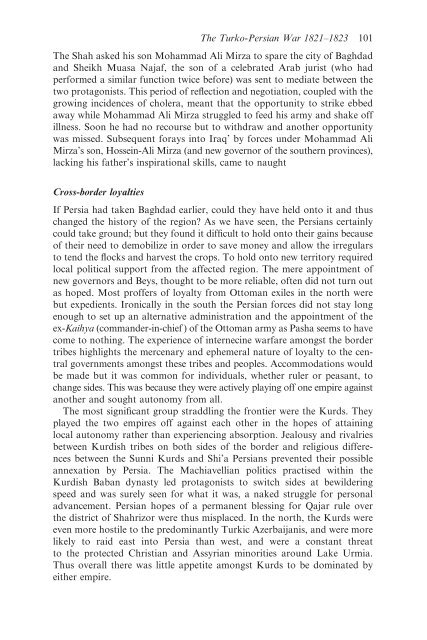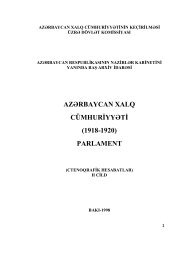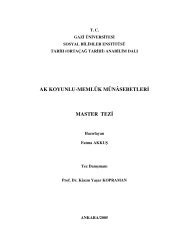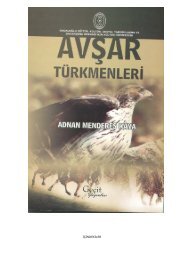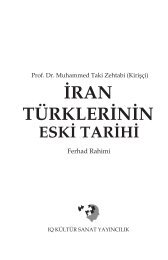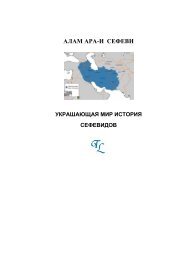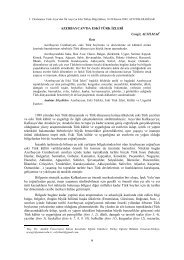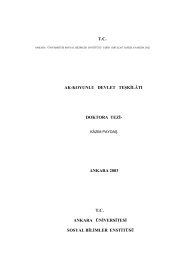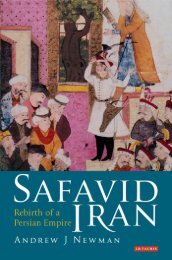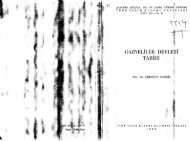War and Peace in Qajar Persia: Implications Past and ... - Oguzlar.az
War and Peace in Qajar Persia: Implications Past and ... - Oguzlar.az
War and Peace in Qajar Persia: Implications Past and ... - Oguzlar.az
- No tags were found...
Create successful ePaper yourself
Turn your PDF publications into a flip-book with our unique Google optimized e-Paper software.
The Turko-<strong>Persia</strong>n <strong>War</strong> 1821–1823 101The Shah asked his son Mohammad Ali Mirza to spare the city of Baghdad<strong>and</strong> Sheikh Muasa Najaf, the son of a celebrated Arab jurist (who hadperformed a similar function twice before) was sent to mediate between thetwo protagonists. This period of reflection <strong>and</strong> negotiation, coupled with thegrow<strong>in</strong>g <strong>in</strong>cidences of cholera, meant that the opportunity to strike ebbedaway while Mohammad Ali Mirza struggled to feed his army <strong>and</strong> shake offillness. Soon he had no recourse but to withdraw <strong>and</strong> another opportunitywas missed. Subsequent forays <strong>in</strong>to Iraq’ by forces under Mohammad AliMirza’s son, Hosse<strong>in</strong>-Ali Mirza (<strong>and</strong> new governor of the southern prov<strong>in</strong>ces),lack<strong>in</strong>g his father’s <strong>in</strong>spirational skills, came to naughtCross-border loyaltiesIf <strong>Persia</strong> had taken Baghdad earlier, could they have held onto it <strong>and</strong> thuschanged the history of the region? As we have seen, the <strong>Persia</strong>ns certa<strong>in</strong>lycould take ground; but they found it difficult to hold onto their ga<strong>in</strong>s becauseof their need to demobilize <strong>in</strong> order to save money <strong>and</strong> allow the irregularsto tend the flocks <strong>and</strong> harvest the crops. To hold onto new territory requiredlocal political support from the affected region. The mere appo<strong>in</strong>tment ofnew governors <strong>and</strong> Beys, thought to be more reliable, often did not turn outas hoped. Most proffers of loyalty from Ottoman exiles <strong>in</strong> the north werebut expedients. Ironically <strong>in</strong> the south the <strong>Persia</strong>n forces did not stay longenough to set up an alternative adm<strong>in</strong>istration <strong>and</strong> the appo<strong>in</strong>tment of theex-Kaihya (comm<strong>and</strong>er-<strong>in</strong>-chief ) of the Ottoman army as Pasha seems to havecome to noth<strong>in</strong>g. The experience of <strong>in</strong>ternec<strong>in</strong>e warfare amongst the bordertribes highlights the mercenary <strong>and</strong> ephemeral nature of loyalty to the centralgovernments amongst these tribes <strong>and</strong> peoples. Accommodations wouldbe made but it was common for <strong>in</strong>dividuals, whether ruler or peasant, tochange sides. This was because they were actively play<strong>in</strong>g off one empire aga<strong>in</strong>stanother <strong>and</strong> sought autonomy from all.The most significant group straddl<strong>in</strong>g the frontier were the Kurds. Theyplayed the two empires off aga<strong>in</strong>st each other <strong>in</strong> the hopes of atta<strong>in</strong><strong>in</strong>glocal autonomy rather than experienc<strong>in</strong>g absorption. Jealousy <strong>and</strong> rivalriesbetween Kurdish tribes on both sides of the border <strong>and</strong> religious differencesbetween the Sunni Kurds <strong>and</strong> Shi’a <strong>Persia</strong>ns prevented their possibleannexation by <strong>Persia</strong>. The Machiavellian politics practised with<strong>in</strong> theKurdish Baban dynasty led protagonists to switch sides at bewilder<strong>in</strong>gspeed <strong>and</strong> was surely seen for what it was, a naked struggle for personaladvancement. <strong>Persia</strong>n hopes of a permanent bless<strong>in</strong>g for <strong>Qajar</strong> rule overthe district of Shahrizor were thus misplaced. In the north, the Kurds wereeven more hostile to the predom<strong>in</strong>antly Turkic Azerbaijanis, <strong>and</strong> were morelikely to raid east <strong>in</strong>to <strong>Persia</strong> than west, <strong>and</strong> were a constant threatto the protected Christian <strong>and</strong> Assyrian m<strong>in</strong>orities around Lake Urmia.Thus overall there was little appetite amongst Kurds to be dom<strong>in</strong>ated byeither empire.


